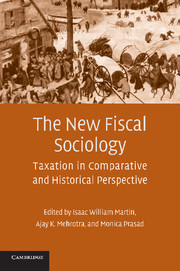Book contents
- Frontmatter
- Contents
- List of Contributors
- Acknowledgments
- Foreword
- 1 The Thunder of History: The Origins and Development of the New Fiscal Sociology
- PART ONE SOCIAL SOURCES OF TAXATION: AMERICAN TAX POLICY IN COMPARATIVE PERSPECTIVE
- PART TWO TAXPAYER CONSENT
- 6 The Politics of Demanding Sacrifice: Applying Insights from Fiscal Sociology to the Study of AIDS Policy and State Capacity
- 7 The End of the Strong State?: On the Evolution of Japanese Tax Policy
- 8 War and Taxation: When Does Patriotism Overcome the Free-Rider Impulse?
- 9 Liberty, Democracy, and Capacity: Lessons from the Early American Tax Regimes
- PART THREE THE SOCIAL CONSEQUENCES OF TAXATION
- References
- Index
6 - The Politics of Demanding Sacrifice: Applying Insights from Fiscal Sociology to the Study of AIDS Policy and State Capacity
Published online by Cambridge University Press: 13 January 2010
- Frontmatter
- Contents
- List of Contributors
- Acknowledgments
- Foreword
- 1 The Thunder of History: The Origins and Development of the New Fiscal Sociology
- PART ONE SOCIAL SOURCES OF TAXATION: AMERICAN TAX POLICY IN COMPARATIVE PERSPECTIVE
- PART TWO TAXPAYER CONSENT
- 6 The Politics of Demanding Sacrifice: Applying Insights from Fiscal Sociology to the Study of AIDS Policy and State Capacity
- 7 The End of the Strong State?: On the Evolution of Japanese Tax Policy
- 8 War and Taxation: When Does Patriotism Overcome the Free-Rider Impulse?
- 9 Liberty, Democracy, and Capacity: Lessons from the Early American Tax Regimes
- PART THREE THE SOCIAL CONSEQUENCES OF TAXATION
- References
- Index
Summary
INTRODUCTION: INSIGHTS FROM THE TAX STATE
Joseph Schumpeter's stirring conclusion in a 1918 text, that “the spirit of a people, its cultural level, its social structure, the deeds its policy may prepare – all this and more is written in its fiscal history,” serves as a mantra for a large body of fiscal sociological scholarship. However, the statement is, of course, hyperbole. Even the most ardent student of fiscal history could not read, as if off a tarot card, all of a state's or a society's actions or the content of its culture from its fiscal system. Among other reasons, this is true because the development of tax systems are largely path-dependent processes – once developed, they are resistant to significant change, even when the initial conditions that produced those outcomes no longer exist. And although the extent of citizen consent or resistance to fiscal demands from the state is likely to indicate a state's overall authority, the challenges of taxing are distinct and independent from other aspects of governing. This chapter seeks to understand the extent to which insights gleaned from fiscal sociological analyses can provide theoretical and empirical guidance for explaining the development of other state capacities requiring a substantial degree of citizen compliance and consent.
There is prima facie evidence to suggest that the study of taxation may provide only limited insights into the rise of other state powers. Specifically, many states that tax well do other things poorly, and vice versa.
- Type
- Chapter
- Information
- The New Fiscal SociologyTaxation in Comparative and Historical Perspective, pp. 101 - 118Publisher: Cambridge University PressPrint publication year: 2009
- 10
- Cited by

